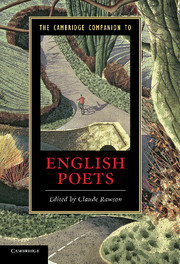Book contents
- Frontmatter
- Introduction
- 1 Geoffrey Chaucer
- 2 Thomas Wyatt
- 3 Edmund Spenser
- 4 William Shakespeare
- 5 John Donne
- 6 Ben Jonson
- 7 George Herbert
- 8 John Milton
- 9 Andrew Marvell
- 10 John Dryden
- 11 Jonathan Swift
- 12 Alexander Pope
- 13 William Blake
- 14 Robert Burns
- 15 William Wordsworth
- 16 Samuel Taylor Coleridge
- 17 George Gordon, Lord Byron
- 18 Percy Bysshe Shelley
- 19 John Keats
- 20 Alfred Lord Tennyson
- 21 Robert Browning
- 22 Emily Brontë
- 23 Christina Rossetti
- 24 Thomas Hardy
- 25 William Butler Yeats
- 26 D. H. Lawrence
- 27 T. S. Eliot
- 28 W. H. Auden
- 29 Philip Larkin
- Further Reading
- Index
16 - Samuel Taylor Coleridge
Published online by Cambridge University Press: 28 May 2011
- Frontmatter
- Introduction
- 1 Geoffrey Chaucer
- 2 Thomas Wyatt
- 3 Edmund Spenser
- 4 William Shakespeare
- 5 John Donne
- 6 Ben Jonson
- 7 George Herbert
- 8 John Milton
- 9 Andrew Marvell
- 10 John Dryden
- 11 Jonathan Swift
- 12 Alexander Pope
- 13 William Blake
- 14 Robert Burns
- 15 William Wordsworth
- 16 Samuel Taylor Coleridge
- 17 George Gordon, Lord Byron
- 18 Percy Bysshe Shelley
- 19 John Keats
- 20 Alfred Lord Tennyson
- 21 Robert Browning
- 22 Emily Brontë
- 23 Christina Rossetti
- 24 Thomas Hardy
- 25 William Butler Yeats
- 26 D. H. Lawrence
- 27 T. S. Eliot
- 28 W. H. Auden
- 29 Philip Larkin
- Further Reading
- Index
Summary
Hope and disappointment
It is difficult to think of another poet whose principal masterpieces seem so different. Auden might be one; but where Auden’s endless versatility feels an integral part of his identity, the miscellaneousness of Coleridge’s poetic career has struck most observers as merely unfortunate, testament to a crucial desultoriness. Coleridge’s poems are actually very numerous, and his life in verse was in one way long and dedicated; but, nevertheless, for no other English poet of comparable rank is a characterization of failure so central a part of the critical tradition. The list of Coleridge’s unwritten poems betrays a poetic life unled: ‘The Brook’, ‘Comforts and Consolations’, an epic on the siege of Jerusalem, ‘The Soother of Absence’, ‘The Flight and Return of Mohammed’ – besides the ideas for innumerable smaller works that flit through the notebook: an ode to pleasure, a poem on suicide, a song entitled ‘Transpositions’, a poem on ‘strange things’. Hazlitt was sharp: ‘Alas! “Frailty, thy name is Genius!” – What is become of all this mighty heap of hope, of thought, of learning and humanity?’ That allows a kind of greatness (by association with Hamlet) while still damning Coleridge with a crippling absence of purpose: ‘While he should be occupied with a given pursuit, he is thinking of a thousand other things; a thousand tastes, a thousand objects tempt him, and distract his mind, which keeps open house, and entertains all comers.’
- Type
- Chapter
- Information
- The Cambridge Companion to English Poets , pp. 308 - 327Publisher: Cambridge University PressPrint publication year: 2011

